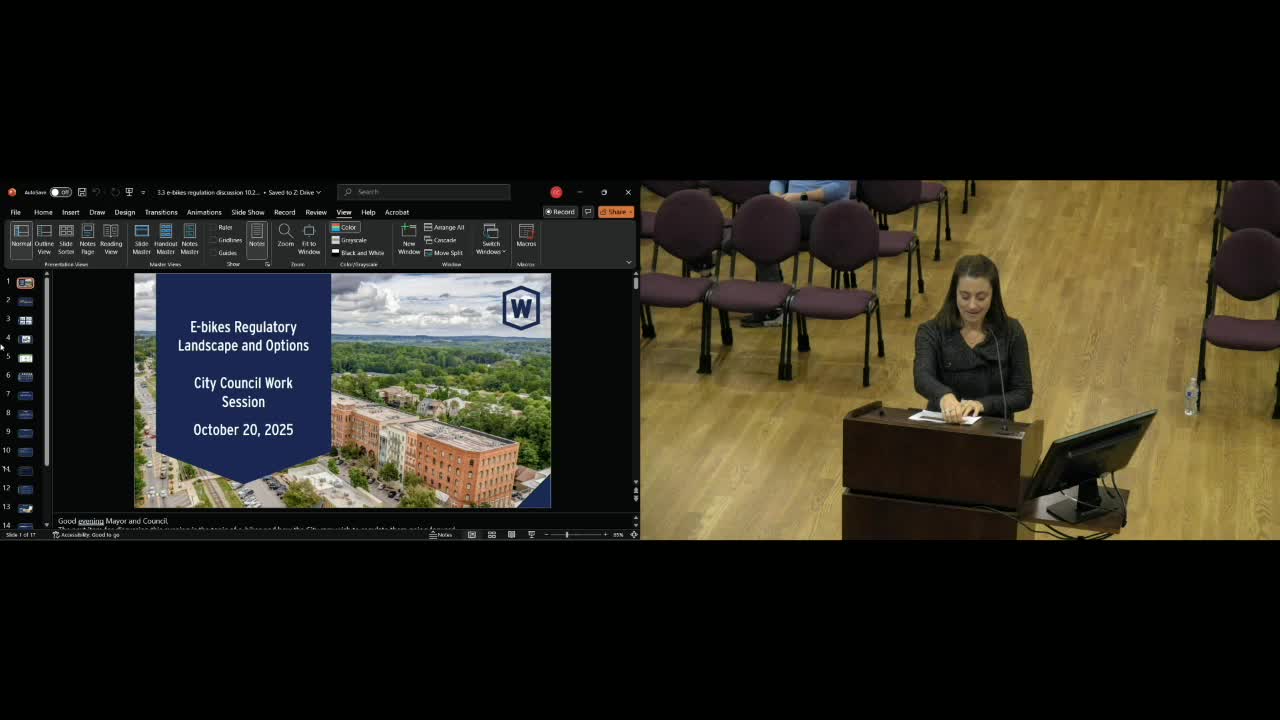Woodstock council debates e-bike limits, seeks legal guidance and enforcement steps
October 20, 2025 | Woodstock City, Cherokee County, Georgia
This article was created by AI summarizing key points discussed. AI makes mistakes, so for full details and context, please refer to the video of the full meeting. Please report any errors so we can fix them. Report an error »

City staff asked for council guidance on local regulation of electric bicycles and similar devices, and council members exchanged views about safety, enforcement and age limits during the Oct. 20 Woodstock City work session.
Melissa Siegmund summarized state classifications and existing statutory guidance and said the statewide framework recognizes three classes of e-bikes: Class 1 (pedal-assist, up to 20 mph), Class 2 (throttle-equipped, up to 20 mph) and Class 3 (higher-speed, up to 28 mph, with additional age and location restrictions). "The state has said, you can't ride any bicycles on a sidewalk," Siegmund told council, adding that municipalities may adopt different rules for sidewalks and multiuse paths and that Class 3 e-bikes are already subject to greater restrictions.
Council members raised recurring complaints about non‑pedal electric vehicles and modified bikes being ridden at high speeds on downtown sidewalks, GreenPrints trails and mountain-bike routes. Several council members said they have observed youth operating vehicles that lack pedals and behave like motorcycles. "If it does not have pedals, it is not a bicycle," one council member said.
Council directions and staff suggestions emerging from the discussion included:
- Limit Class 3 e-bikes from sidewalks and multiuse trails and restrict their use to streets; explore minimum age (council members discussed ages in the 15–16 range for higher-speed devices).
- Clarify local regulations and post signage/maps to show where bicycles and e-bikes are permitted in downtown versus pedestrian-priority corridors.
- Ask the city attorney for a formal legal opinion on whether the city can require licensing or age minimums for certain e-bike classes and whether helmet requirements can be imposed for street use.
- Coordinate enforcement of existing traffic laws (for example, stop-sign violations) against operators of any device using the roadway; staff noted that many problematic devices are already illegal if modified into a moped or motorcycle class without proper licensing.
Council members also asked staff to consult neighboring jurisdictions and local bike shops about device prevalence, and to research safety concerns such as battery fire risks. Multiple council members said they favor starting with restrictions on Class 3 e-bikes and clearer signage before moving to broader limits on Class 1 and 2 devices.
No ordinance was introduced or voted on at the work session; staff said they would bring follow-up items, including legal research and potential draft code amendments, back to council for further consideration.
Melissa Siegmund summarized state classifications and existing statutory guidance and said the statewide framework recognizes three classes of e-bikes: Class 1 (pedal-assist, up to 20 mph), Class 2 (throttle-equipped, up to 20 mph) and Class 3 (higher-speed, up to 28 mph, with additional age and location restrictions). "The state has said, you can't ride any bicycles on a sidewalk," Siegmund told council, adding that municipalities may adopt different rules for sidewalks and multiuse paths and that Class 3 e-bikes are already subject to greater restrictions.
Council members raised recurring complaints about non‑pedal electric vehicles and modified bikes being ridden at high speeds on downtown sidewalks, GreenPrints trails and mountain-bike routes. Several council members said they have observed youth operating vehicles that lack pedals and behave like motorcycles. "If it does not have pedals, it is not a bicycle," one council member said.
Council directions and staff suggestions emerging from the discussion included:
- Limit Class 3 e-bikes from sidewalks and multiuse trails and restrict their use to streets; explore minimum age (council members discussed ages in the 15–16 range for higher-speed devices).
- Clarify local regulations and post signage/maps to show where bicycles and e-bikes are permitted in downtown versus pedestrian-priority corridors.
- Ask the city attorney for a formal legal opinion on whether the city can require licensing or age minimums for certain e-bike classes and whether helmet requirements can be imposed for street use.
- Coordinate enforcement of existing traffic laws (for example, stop-sign violations) against operators of any device using the roadway; staff noted that many problematic devices are already illegal if modified into a moped or motorcycle class without proper licensing.
Council members also asked staff to consult neighboring jurisdictions and local bike shops about device prevalence, and to research safety concerns such as battery fire risks. Multiple council members said they favor starting with restrictions on Class 3 e-bikes and clearer signage before moving to broader limits on Class 1 and 2 devices.
No ordinance was introduced or voted on at the work session; staff said they would bring follow-up items, including legal research and potential draft code amendments, back to council for further consideration.
View full meeting
This article is based on a recent meeting—watch the full video and explore the complete transcript for deeper insights into the discussion.
View full meeting
